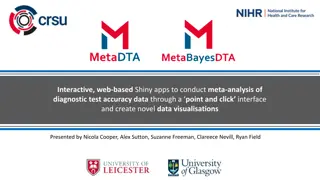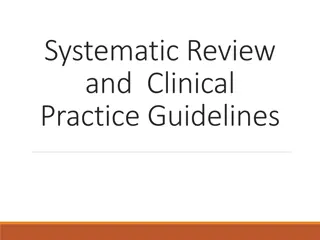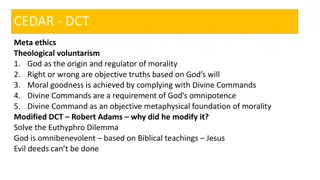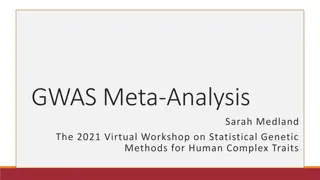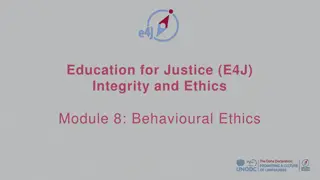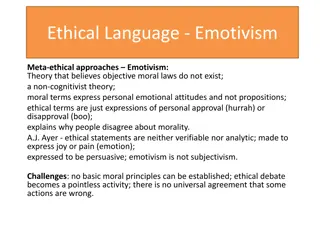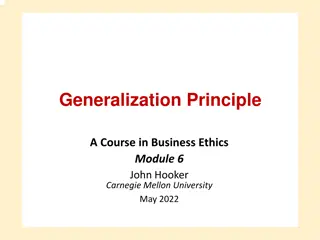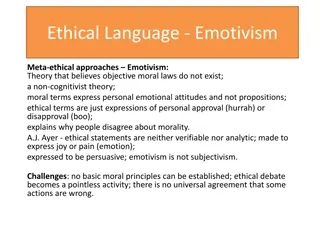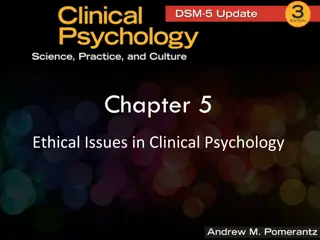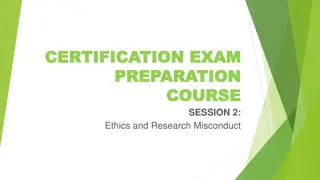Introduction to Meta-analysis in Stata
This workshop, presented by Dr. Christine R. Wells from UCLA, provides an in-depth exploration of meta-analysis in Stata. Participants will learn about systematic reviews, data collection and organization, running meta-analyses, interpreting results, creating graphs, and identifying biases. The focu
2 views • 181 slides
Interactive Web-Based Shiny Apps for Meta-Analysis of Diagnostic Test Accuracy
Explore interactive Shiny apps presented by Nicola Cooper and team for conducting meta-analysis of diagnostic test accuracy data with a point-and-click interface. Find educational primers, principles, and tools to enhance evidence synthesis methods and visualization in healthcare.
2 views • 22 slides
Understanding Business Ethics Theories and Principles
Explore various business ethics theories including Ethical Concepts, Moral Behavior Development, Ethical Principles, and the Role of Ethics in Business. Delve into the concept of ethics, moral behavior evolution, ethical principles like autonomy, honesty, justice, and integrity, and the importance o
10 views • 17 slides
Substituent Effects on Benzene Reactivity and Orientation
Substituents in benzene derivatives influence reactivity and orientation in electrophilic substitution reactions. They can be classified as ortho-para directing or meta directing based on their effect. Ortho-para directing groups increase electron density and activate the ring, while meta directing
7 views • 14 slides
Introduction to Three-Level Meta-Analysis Models in R: A Practical Example
Explore three-level meta-analysis models in R with a focus on the association between paternal anxiety and child emotional problems. Learn to prepare data files, fit models using the rma.mv function in metafor, and understand the structure of the formula for random effects. Follow along with a step-
7 views • 22 slides
Ethical Considerations in Self-Care for Behavioral Health Professionals
Exploring the ethical obligations of behavioral health professionals towards self-care to prevent compassion fatigue, this content sheds light on compassion fatigue, compassion satisfaction, and the importance of ethical codes in promoting self-care practices. By emphasizing the link between self-ca
0 views • 13 slides
Understanding Systematic Reviews, Meta-analysis, and Clinical Practice Guidelines
Explore the importance of systematic reviews, critical appraisal questions, meta-analysis, and clinical practice guidelines in the healthcare field. Learn about the process of appraising systematic reviews, the significance of meta-analysis, and the benefits of following clinical practice guidelines
1 views • 16 slides
Ethical Considerations in School Psychology: Navigating Codes and Principles
Explore ethical considerations in school psychology, encompassing ethical codes, legal requirements, and professional principles to address dilemmas and promote integrity. Gain insights into key ethical codes, legal mandates, and overarching ethical principles relevant to school psychologists' pract
1 views • 31 slides
Exploring Meta-Ethics: Understanding Ethical Principles
Meta-ethics delves into the nature and validity of ethical statements, examining the meaning of right and wrong and the basis for moral claims. It explores distinctions between descriptive and normative ethics, cognitive and non-cognitive perspectives, and various ethical approaches such as naturali
0 views • 34 slides
Comprehensive Overview of Admetan: A New Meta-Analysis Command
This meta-analysis command, Admetan, introduced by David Fisher from MRC Clinical Trials Unit at UCL, offers a comprehensive analysis of combining results from independent studies. It builds on the history of meta-analysis in Stata and aims to enhance capabilities for researchers. Admetan provides f
1 views • 19 slides
Meta-Analysis in GWAS: Methods and Applications
Meta-analysis in GWAS involves combining data across studies to estimate overall effects, explore cohort differences, improve power, and replicate findings. It includes joint vs. meta-analysis, methods, and types such as fixed effect and random effect meta-analyses.
0 views • 20 slides
Understanding Natural Law Theory: Morality and Divine Commands
Natural Law Theory, influenced by thinkers like St. Thomas Aquinas and Aristotle, posits that morality is derived from rational thought and divine commands. The theory emphasizes the importance of following moral absolutes to establish a right relationship with God and achieve eternal life. By study
1 views • 36 slides
Understanding and Applying Behavioural Ethics in Education for Justice (E4J)
This module focuses on debunking common myths about ethical behavior, treating ethics as a design problem, and implementing design-based solutions to encourage ethical behavior. Students will learn to identify ethical risks, turn principles into practice, and design contexts that facilitate ethical
3 views • 10 slides
Understanding Emotivism in Ethical Philosophy
Emotivism is a meta-ethical theory that rejects objective moral laws, instead positing that moral terms express personal emotional attitudes, not universal truths. Influenced by A.J. Ayer and rejecting naturalism, this theory suggests that ethical statements are not objective propositions but rather
0 views • 28 slides
Ethical Decision Making in Clinical Practice: Understanding Dilemmas and Solutions
An examination of ethical decision making in nursing, focusing on defining ethical dilemmas, addressing moral distress, and exploring the purpose of nursing ethics. The importance of aligning personal and professional values, ethical principles, and laws in resolving ethical dilemmas is discussed, a
0 views • 8 slides
Meta-Evaluation of Private Sector Interventions in Agribusiness: Impacts and Methodologies
This meta-evaluation study explores the impact of access to finance and farmer/business training interventions on agribusiness indicators. It discusses the methodologies used in evaluations, highlighting the use of randomized control trials and quasi-experimental methods. Findings provide insights i
0 views • 25 slides
Meta's Role in Amplifying Anti-Rohingya Hate on Facebook
The investigation findings reveal Meta's failure to address hate speech and incitement against the Rohingya people on Facebook, resulting in a platform that amplified and promoted harmful content. Despite admitting in 2018 that more needed to be done, Meta's business model of data collection and eng
4 views • 7 slides
Ethical Theories: Divine Command vs. Virtue Theory Explained
Divine Command Theory asserts that morality is derived from God's commands, contrasting with Virtue Theory which focuses on developing moral virtues to achieve human flourishing and excellence. Divine Command Theory relies on religious texts, while Virtue Theory emphasizes the cultivation of virtues
0 views • 24 slides
Meta-programming in Haskell: A Closer Look at Splices and Quotations
Explore the world of meta-programming in Haskell through splices and quotations. Learn about successful extensions introduced by Simon Peyton Jones and Tim Sheard, including practical examples like generating source code using splices that are type-checked and compiled at compile time. Dive into con
0 views • 45 slides
Meta-Analysis of Convention Satisfaction and Loyalty Trends
This meta-analysis explores the relationship between attributes, perceptions, satisfaction, and loyalty in the convention industry. It highlights key findings from multiple studies using statistical methods to analyze attendee satisfaction and loyalty factors. The study emphasizes the importance of
0 views • 11 slides
Exploring Funnel Plots in Meta-analysis with Metafor in R
Funnel plots in meta-analysis help assess distribution symmetry, heterogeneity, and publication bias. The trim and fill analysis with Metafor in R examines data transformations, imputes missing values, and performs sensitivity analysis through re-computing funnel plots.
0 views • 4 slides
Understanding Prediction and Confidence Intervals in Meta-Analysis
Conceptually, I-squared represents the proportion of total variation due to true differences between studies, while Proportion of total variance is due to random effects. Prediction intervals provide a range where study outcomes are expected, unlike confidence intervals which contain the parameter's
0 views • 26 slides
Exploring the Future Role of State Governance through Meta-Governance and Political Leadership
Governance research perspective discusses the evolving role of the state in mobilizing public and private actors through interactive forms of governance. Meta-governance theory emphasizes the governance of governance, with a focus on interactive governance arenas. Recent theories of political leader
0 views • 11 slides
Interactive Microbiome Data Analysis with Parallel-Meta Suite
Conduct interactive and rapid microbiome data analysis on various platforms using Parallel-Meta Suite. This software, developed by a team from Qingdao University, simplifies the process from installation to verification. Utilize the step-by-step guide to download, install, and verify the software to
0 views • 13 slides
Understanding Contexts: A Meta-Ontological Approach
Ontologies provide a general representation of reality, but knowledge is mostly context-dependent. Analyzing different types of contexts, from linguistic to manufacturing, remains a challenge. This study aims to deepen the understanding of the ontological nature of contexts by leveraging a meta-onto
0 views • 14 slides
Theories of Interest in Microeconomics II
Explore various theories of interest in economics, including the Classical Theory, Liquidity Preference Theory by Keynes, Productivity Theory, Abstinence Theory, Time-Preference Theory, Fisher's Time Preference Theory, and the Loanable Fund Theory. These theories offer different perspectives on the
0 views • 6 slides
Understanding Ethical Principles and Acting for Reasons
Ethical principles are crucial for objective decision-making, preventing rationalization. The Generalization Principle emphasizes the need for rationale in actions. The Universality of Reason asserts that rationality is independent of personal identity. Acting for Reasons theory underscores that eve
0 views • 41 slides
The CPA's Guide to Ethical Behavior by Jolene A. Lampton, Ph.D., MBA, BSE, CPA, CGMA & CFE
Delve into the ethical realm with insights from Jolene A. Lampton, a seasoned CPA, as she explores the essence of ethical behavior in the accounting profession. Discover the fundamental principles of honesty, integrity, and compassion that underpin ethical conduct, drawing from historical philosophe
0 views • 39 slides
Geographical Latent Variable Models for Microblog Retrieval
Addressing challenges in microblog retrieval such as vocabulary mismatch and multi-faceted relevance signals. Explore opportunities in leveraging lexical and non-lexical information, including geographical meta-data. Discuss prior work on utilizing timestamps and re-tweets, while also highlighting t
0 views • 19 slides
Understanding Emotivism: A Non-Cognitivist Theory in Ethics
Emotivism is a meta-ethical theory that posits the absence of objective moral laws, suggesting moral terms express personal emotional attitudes rather than propositions. Influenced by philosophers like A.J. Ayer and Hume, it challenges the existence of basic moral principles and universal agreement
0 views • 23 slides
Developing Essential Meta-Skills for Personal Growth
Enhancing meta-skills such as focusing, initiative, integrity, adapting, collaborating, leading, communicating, and feeling is crucial for personal development. These skills enable individuals to maintain concentration, make confident decisions, uphold ethical values, embrace change, build relations
0 views • 14 slides
Bayesian Meta-Prior Learning Using Empirical Bayes: A Framework for Sequential Decision Making Under Uncertainty
Explore the innovative framework proposed by Sareh Nabi at the University of Washington for Bayesian meta-prior learning using empirical Bayes. The framework aims to optimize ad layout and classification problems efficiently by decoupling learning rates of model parameters. Learn about the Multi-Arm
0 views • 27 slides
Understanding Ethical Responsibility in Human Communication
Ethical responsibility in human communication entails making judgments on rightness, wrongness, virtue, and obligation. It explores the importance of choice, coercion, and the distinction between morals and ethics. The text delves into relativism, ethical ramifications in communication, and the prac
0 views • 9 slides
Engineering Ethics in Practice: A Guide for Engineers by Prof. Dr. Halit Hami Z. - Insights and Reflections
The book "Engineering Ethics in Practice: A Guide for Engineers" by Prof. Dr. Halit Hami Z. from Kafkas University provides insights on a range of ethical issues faced by engineers. Through case studies, it highlights the importance of addressing ethics in engineering work and offers guidance on nav
0 views • 54 slides
Exploring Applied Medical Ethics and Ethical Dilemmas in Healthcare
Delve into the realm of applied medical ethics with Dr. Deepthi Edussuriya, a senior lecturer, as you learn to identify ethical considerations and evaluate approaches to solving ethical dilemmas in medical practice. Understand the principles approach and the use of philosophical methods to determine
0 views • 37 slides
Declaration of Ethical Governance by CIGFARO & Partners
In the declaration by CIGFARO & partners, ethical leadership and governance are emphasized, advocating for ethical conduct at all levels of leadership. The commitment to upholding ethical values, accountability, and promoting ethical behavior within professional roles are key themes throughout the d
0 views • 6 slides
Ethical Issues in Clinical Psychology: Understanding the APA Code of Ethics
Explore the ethical considerations in clinical psychology outlined by the APA Code of Ethics. Key topics covered include confidentiality, informed consent, competence, and more. Learn about the aspirational and enforceable aspects of the code, ethical principles such as beneficence and integrity, an
0 views • 24 slides
Understanding Ethical Traps in Psychotherapy
Delve into the complexities of ethical considerations in psychotherapy, exploring moral, ethical, and legal codes, APA General Principles, specific ethical principles such as informed consent and confidentiality, and real-world scenarios prompting ethical dilemmas in therapy practice. Consider the i
0 views • 18 slides
Critique of Ethical Schools: A Comparative Analysis
This article explores three main ethical schools - utilitarianism, deontology, and virtue theory - and delves into their distinct emphases and elements. It highlights the differences in how each school views lying and ethical decision-making. Additionally, it discusses the incorporation of ethical p
0 views • 45 slides
Ethics and Research Misconduct: A Course on Ethical Principles in Clinical Research
This course session covers essential topics related to ethics and research misconduct in clinical research, including definitions, ethical principles, key reports, and scenarios. The session emphasizes the importance of upholding ethical standards, such as respect, justice, beneficence, and accounta
0 views • 54 slides

